完整版自考英语二重点班讲义01--15
自考英语二第十五单元讲义

Unit15 Text AFour Minutes That Get You Hired面试的秘诀resume n.简历e.g. She sent her resumes to several companies, but didn’t even get an interview. professionalism n.职业特征,职业作风morals n.(pl)伦理,道德likable a.可爱的,让人喜欢的consciousness n.意识, 知觉, 自觉, 觉悟, 个人思想competent adj.有能力的, 胜任的authoritative adj.权威的, 有权威的, 命令的annual n.一年生植物, 年刊, 年鉴adj.一年一次的, 每年的, 一年生的influential a. 有影响的initiate vt.开始, 发动, 传授v.开始, 发起desperate a.绝望的,不顾一切的,拼命的e.g. By then, I was desperate for a holiday.applicant n.申请人,请求者 apply v.申请apologetic a.道歉的,辩护的,辩解的tentative n.试验, 假设adj.试验性的, 试探的, 尝试的, 暂定的implore vt.恳求, 哀求narcissism n.自我陶醉,自恋comment n.注释, 评论, 意见vi.注释, 评论e.g. When asked about his relationship with his former secretary, the boss replied “No comment.”oppose vt.反对, 使对立, 使对抗, 抗争vi.反对 be opposed to sth. 反对e.g. His view of the situation is strongly opposed to mine.care about 在乎drop by 顺便访问be bound to do 一定会做,必定会做e.g. Don’t lie to her.She is bound to find out about it.remark on 评论,谈论To get the right job,learn to make the right impression要想获得满意的工作,就要学会留下最好的印象The 28-year-old Bay Stater spent six years working at night while she attended college during the day.六年来,28岁的贝?斯黛特白天上大学,晚上工作。
00015英语(二)串讲资料

自考“英语(二)”串讲资料语法主要考哪些项目?英语(二)最常考的语法项目包括:动词时态和语态、非谓语动词、虚拟语气、定语从句、名词性从句、状语从句、比较级、语序、主谓一致、强调句、基本句型。
* 最常考的时态:现在完成时、过去完成时、过去时、一般现在时和将来完成时。
* 最常考的非谓语动词:独立结构、动名词作某些动词的宾语、非谓语动词作定语和状语。
* 最常考的虚拟语气:与过去事实相反的虚拟语气的从句和主句。
* 最常考的定语从句:where 引导的定语从句、名词/代词+ of + which引导的定语从句。
* 名词性从句:what,whether 引导的主语或宾语从句、that 引导的同位语从句。
* 状语从句:now that,in that,in case,as,while 引导的状语从句。
哪些词最有可能考单词拼写?严格来说,只要是考纲中包括的词都有可能出现在单词拼写大题中,但是从历年考题可以看出,某些词的命中率要高于其它词,有些词甚至反复考过,这说明考生在背单词的时候还是可以在全面覆盖的基础之上突出重点、提高效率的。
在这里我们不可能一一罗列重要的词汇,下面是我总结的英语(二)常考单词的特点:* 绝大部分是长度在5-8个字母之间的中等难度的词,如:victim,gesture 等;* 拼写和读音不完全对称的词,如:dumb,subtle等。
* 个别非常简单、但课文中不是很常见的名词,如:tube.* 从词性上来看,最常考的依次是名词、形容词、动词、和副词。
在复习这些单词时,一定要以考试大纲为准,而不能只背教材后面的生词表。
一方面,教材后面的生词表中包含了不少超刚词,完全不会考到;另一方面,对英语(二)来说,从下册教材生词表中出的单词只占三分之一,不可能涵盖所有要考的内容。
同样在复习时一定要讲究准确性,确保背一个记准一个,而不能只是记个大概,最后写出来每个都差不多但每个都有错。
复习建议针对上述预测,我们如何制定冲刺阶段的复习计划呢?下面是我推荐的三步复习法。
自学考试《英语(二)》串讲资料(一)
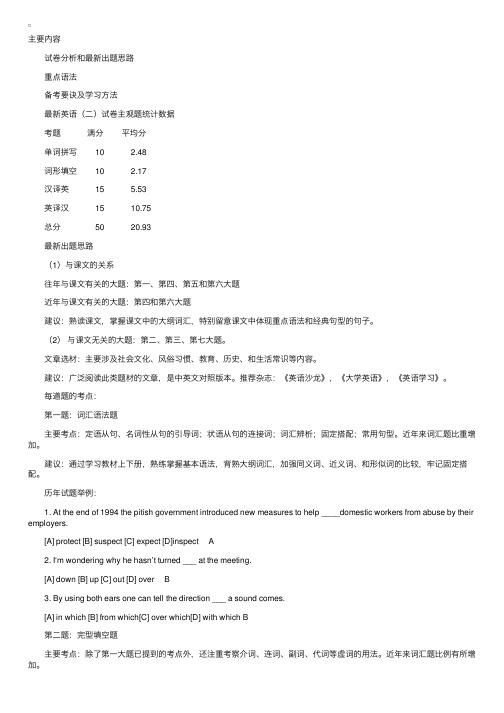
主要内容 试卷分析和最新出题思路 重点语法 备考要诀及学习⽅法 最新英语(⼆)试卷主观题统计数据 考题 满分 平均分 单词拼写 10 2.48 词形填空 10 2.17 汉译英 15 5.53 英译汉 15 10.75 总分 50 20.93 最新出题思路 (1)与课⽂的关系 往年与课⽂有关的⼤题:第⼀、第四、第五和第六⼤题 近年与课⽂有关的⼤题:第四和第六⼤题 建议:熟读课⽂,掌握课⽂中的⼤纲词汇,特别留意课⽂中体现重点语法和经典句型的句⼦。
(2)与课⽂⽆关的⼤题:第⼆、第三、第七⼤题。
⽂章选材:主要涉及社会⽂化、风俗习惯、教育、历史、和⽣活常识等内容。
建议:⼴泛阅读此类题材的⽂章,是中英⽂对照版本。
推荐杂志:《英语沙龙》,《⼤学英语》,《英语学习》。
每道题的考点: 第⼀题:词汇语法题 主要考点:定语从句、名词性从句的引导词;状语从句的连接词;词汇辨析;固定搭配;常⽤句型。
近年来词汇题⽐重增加。
建议:通过学习教材上下册,熟练掌握基本语法,背熟⼤纲词汇,加强同义词、近义词、和形似词的⽐较,牢记固定搭配。
历年试题举例: 1. At the end of 1994 the pitish government introduced new measures to help ____domestic workers from abuse by their employers. [A] protect [B] suspect [C] expect [D]inspect A 2. I‘m wondering why he hasn’t turned ___ at the meeting. [A] down [B] up [C] out [D] over B 3. By using both ears one can tell the direction ___ a sound comes. [A] in which [B] from which[C] over which[D] with which B 第⼆题:完型填空题 主要考点:除了第⼀⼤题已提到的考点外,还注重考察介词、连词、副词、代词等虚词的⽤法。
自考英语二串讲(珍藏版)(1)

A. the oldest; the wiser B. older; wiser
C. the older, the more wise D. the older; the wiser (D)
Unit 3
• 重点单词和短语
• deteriorate opposed to) accessible
• 参考资料:《英语(二)自学考试大纲》,全国高等教育自学考试指 导委员会制订,高等教育出版社出版
第二讲 重点知识讲解回顾
Unit 1
• 重点单词和短语
• objective accomplish predict accompany attain scheme skilled argue define
• 例:It is suggested that the meeting (should) be held (hold)at some other time.
• 3. … decision making includes limiting alternatives as well as identifying
• seek to do sth. in part point of view vary from…to … • 例:I hope my boy friend will be handsome, strong and ___ kind. (06-4)
A. above all B. in all C. at all D. after all
解析:动词let, make, have, hear, see, observe等词之后的宾语补足语为省 略to 的不定式结构。
• 6. There is little likelihood that …
2021年最新出版自考英语(二)讲义 Unit 1 The Power of Languag

2021年最新出版自考英语(二)讲义Unit 1 The Power ofLanguag2021年自考“英语(二)”备考资料(新版教材 unit 1)Unit 1 The Power of Language I. New words and expressions New words 1. critical adj. 有判断力的;判断公正(或审慎)的 2. non-fiction n. 纪实文学 3. position n. 观点;态度;立场 4. statement n. 说明;说法;表态 5. question v. 表示疑问;怀疑out of question / out of the question 6. evaluate v. 估计;评价;评估7. context n. 事情发生的背景,环境,来龙去脉 8. value n. values [pl.]是非标准;价值观 valuableinvaluable=priceless valueless9. represent v. 描述;表现 representative adj./n. 10. assertion n. 明确肯定;断言 11. sufficient adj. 足够的;充足的 sufficiency insufficient12. statistic n. statistics [pl.]统计数字;统计资料 13. integrate v.(使)合并,成为一体 14. authority n.专家;学术权威;泰斗 an/the authority on sth. authorize15. compare v. 比较;对比 compare A with B compare A to B16. subject n. 主题;题目;题材 17. consistent adj. 相符的;符合的 18. inconsistency n. 不一致 19. assumption n. 假定;假设 20. case n. 具体情况;事例 in case in case of fire in case that…a case in pointconfirmed/suspected cases 21. directly adv. 直接地;径直地 22. identify v. 找到;发现23. valid adj. 符合逻辑的;合理的;确凿的 validity n. 有效性,正确(性) invalid24. credible adj. 可信的;可靠的 incredible=unbelievable25. landmark n.(标志重要阶段的)里程碑 26. relevant adj. 紧密相关的;切题的 relevancy n. 关联;恰当 irrelevant27. current adj. 现时发生的;当前的 28. appropriate adj. 合适的;恰当的 inappropriateIt's (not) appropriate that …. 29. bias n. 偏见;偏心;偏向30. considerably adv. 非常;很;相当多地 consider considering considerable considerate consideration31. Democrat n. (美国)民主党党员,民主党支持者民 32. Republican n. (美国)共和党党员,共和党支持者 33. reflect v. 显示;表明;表达 34. informed adj. 有学问的;有见识的 well-informed ill-informedPhrases and Expressions 1. apply to 使用;应用 2. put forth 提出;产生3. take … into account 考虑到;顾及4. accept/take … at face value 相信表面;信以为真5. with a grain of salt 有保留地;持怀疑态度地 II. Text Learning Critical Reading① (1)Critical reading applies to non-fiction writing in which the authorputs forth a position or seeks to make a statement. Critical reading is active reading. It involves more than just(不只是,不仅仅是)understanding what an author is saying. Critical reading involves questioning and evaluating what the author is saying, and forming your own opinions about what the author is saying. Here are the things you should do to be a critical reader.(启下句)本部分重点及难点:1. Critical reading applies to non-fiction writing in which the author puts forth a position or seeks to make a statement. apply to sb./sth.= be applicable to sb./sth. apply的派生词:application, applicant, applicable② Consider the context of what is written. You may be reading something that was written by an author from a different culturalcontext than yours. (2)Or, you may be reading something written some time ago in a different time context than yours. (3)In either case, you must recognize and take into account any differences between your values and attitudes and those represented by the author. 本部分重点及难点: 2. Or, you may be reading something written some time ago in a different time context than yours. some time注意区分:sometime / sometimes / some times3. In either case, you must recognize and take into account anydifferences between your values and attitudes and those represented by the author. 不论哪种情况,你必须注意并考虑你的价值观和态度与作者所述的价值观和态度有何不同。
自考英语(二)讲义完整版

自考英语(二)讲义完整版自考英语(二)讲义完整版一讲义一Text A What Is a Decision ?I.课文内容简介决策的目的是制定和实现组织目标。
作决策的原因是有问题存在、目标和目的不正确、或者有某种东西防碍目标或目的的实现。
作决策的过程对管理人员来说至关重要。
决策者必须具备从多个可供选择的可能性中确定最佳选择的手段。
而多种目标的顺序和重要性也部分地基于决策者的价值观。
今天所作的决策可能会对将来产生深远的影响。
因此,有经验的管理者能从当前决策看到将来的效果。
段落大意:课文分成三部分第一、二段:决策的定义The definition of decision第三、四段:作决策的一般过程The general process of making a decision第五至九段:在管理层次上,多种因素影响决策的制定Various factors influencing decision making at the managerial level II.New Wordsorganizational a. 组织上的goal n. 目的,目标objective n./a. 目标,目的/客观的,真实的accomplish vt. 完成(任务等)predict vt./vi. 预言;预示accompany vt. 伴随,陪同implement vt. 实现;完成constraint n. 强制;强制因素precedent n. 先例,前例simplify vt. 简化tendency n. 趋势,倾向managerial a. 经理的,管理人的maker n. 制造者;制造商achievement n. 完成,达到attain vt. 达到;完成optimal a. 最适宜的,最理想的suboptimization n. 局部最优化trade-off n. 权衡;物物交换argue vt./vi. 争辩,争论budget n./vt. 预算scheme n./vt.把…编入预算define vt. 解释,给…下定义multiple a./n.多样的,复合的/倍数profitability n. 赚钱,获利correctness n. 正确,正确性unintended a. 非计划中的,非故意的ongoing a. 进行中的,非故意的entity n. 存在,实体skilled a. 熟练的;有技能的in the way 挡路、碍事to make a guess at 猜测and the like 等等,诸如此类to seek to 追求,争取in part 部分地,在某种程度上point of view 观点词汇精讲1.goal n. 目标,进球,球门(同义词:aim ,end ,purpose,objective)Her goal is a place at university . 她的目标是在大学任教。
自考英语二重点串讲
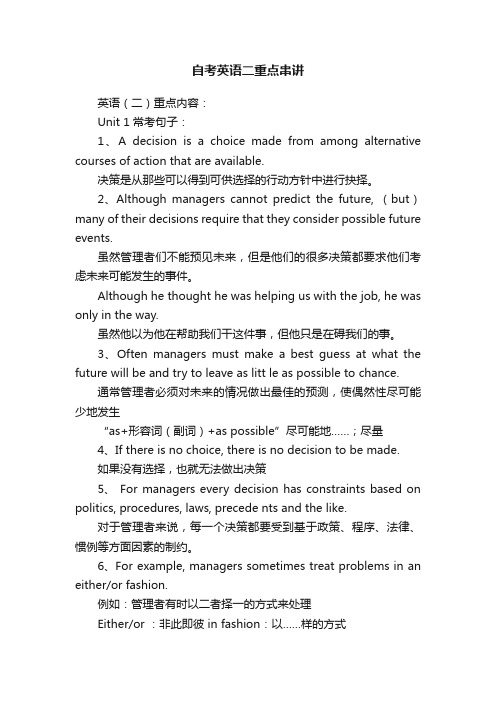
自考英语二重点串讲英语(二)重点内容:Unit 1常考句子:1、A decision is a choice made from among alternative courses of action that are available.决策是从那些可以得到可供选择的行动方针中进行抉择。
2、Although managers cannot predict the future, (but)many of their decisions require that they consider possible future events.虽然管理者们不能预见未来,但是他们的很多决策都要求他们考虑未来可能发生的事件。
Although he thought he was helping us with the job, he was only in the way.虽然他以为他在帮助我们干这件事,但他只是在碍我们的事。
3、Often managers must make a best guess at what the future will be and try to leave as litt le as possible to chance.通常管理者必须对未来的情况做出最佳的预测,使偶然性尽可能少地发生“as+形容词(副词)+as possible”尽可能地……;尽量4、If there is no choice, there is no decision to be made.如果没有选择,也就无法做出决策5、 For managers every decision has constraints based on politics, procedures, laws, precede nts and the like.对于管理者来说,每一个决策都要受到基于政策、程序、法律、惯例等方面因素的制约。
(完整版)自考英语二重点讲解复习资料
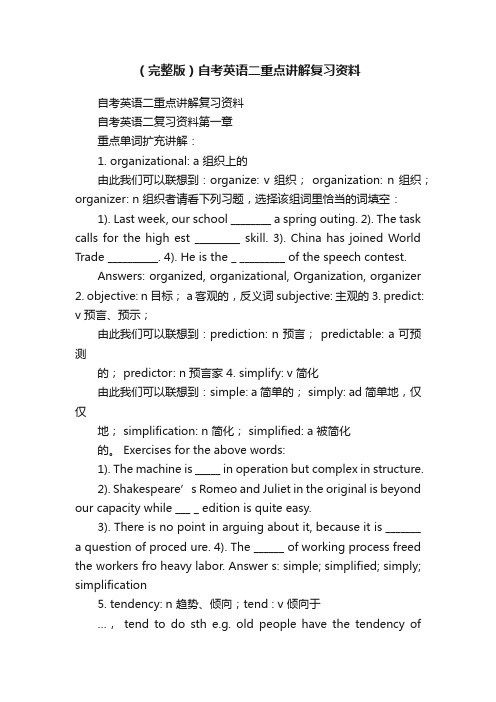
(完整版)自考英语二重点讲解复习资料自考英语二重点讲解复习资料自考英语二复习资料第一章重点单词扩充讲解:1. organizational: a 组织上的由此我们可以联想到:organize: v 组织; organization: n 组织;organizer: n 组织者请看下列习题,选择该组词里恰当的词填空:1). Last week, our school ________ a spring outing. 2). The task calls for the high est _________ skill. 3). China has joined World Trade __________. 4). He is the _ _________ of the speech contest.Answers: organized, organizational, Organization, organizer 2. objective: n 目标; a 客观的,反义词subjective: 主观的 3. predict: v 预言、预示;由此我们可以联想到:prediction: n 预言; predictable: a 可预测的; predictor: n 预言家 4. simplify: v 简化由此我们可以联想到:simple: a 简单的; simply: ad 简单地,仅仅地; simplification: n 简化; simplified: a 被简化的。
Exercises for the above words:1). The machine is _____ in operation but complex in structure.2). Shakespeare’s Romeo and Juliet in the original is beyond our capacity while ___ _ edition is quite easy.3). There is no point in arguing about it, because it is _______a question of proced ure. 4). The ______ of working process freed the workers fro heavy labor. Answer s: simple; simplified; simply; simplification5. tendency: n 趋势、倾向;tend : v 倾向于…,tend to do sth e.g. old people have the tendency ofgetting fatter. Or old peop le tend to get fatter. 6. managerial: a 经理的、经营上的;由此我们可以联想到:manage: v管理、经营; management: n; manager: n 经营者,管理者; manageable: a 可管理的、可经营的。
自考复习资料00015英语二文件324页

英语二00015复习资料大全名师串讲综合自考英语二00015(珍藏版)上册Grammar & UsageⅠ)1.主谓一致的三条原则(1)语法一致,即在语法形式上取得一致。
Human beings enjoy learning.Everybody‘s understanding is incomplete.(2)意义一致,即根据意义来处理一致关系。
The people there are fighting for the independence of their country.Ten dollars was a lot of money at that time.(3)就近原则,即谓语动词的单、复数形式取决于最靠近它的词语。
There is a pen,two pencils and an eraser in the pencil box.Neither the boy nor his teachers know the answer.2.集体名词作主语时与动词的一致(1)当主语为furniture,equipment,machinery等词时,谓语动词通常用单数。
The furniture in that shop is all made in China.Office equipment is very expensive nowadays.(2)集体名词如people,cattle,police,poultry等往往作复数用。
Some people drive madly in this country.Many cattle have died because of the flood.(3)family,government,class,committee,audience,team,public等词被视作一个整体时,其后的动词用单数;被视为构成整体的个体时,其后的动词则为复数。
自考英语二第二单元讲义

Unit 2Text Asalesgirl n.女售货员couple n.几个,一对glance vi.看一下瞥一眼He glanced nervously at his watch when he was waiting for the bus.uncomfortable a.不舒服的,不自在的behave vi 举止desire vt.想望, 期望, 希望, 请求(官方丈礼)n.愿望, 心愿, 要求v.要求 They showed a desire to improve relations.She desires that he (should) do it at once.distant a.在远处的,疏远的outsider n.外人,局外人,门外汉feature n.特征,特色mark n.标志, 分数, 痕迹, 记号You’d better make some marks while reading.vt.做标记于, 打分数, 标志vi.作记号Please mark all of the large cities on this map.adapt vt.使适应, 改编Can you adapt your way of thinking to the new life-style?adopt vt.采用, 收养 They were trying to persuade the UN to adopt an aggressivenly anti-American resolution.accent n.重音, 口音, 重音符belong vi.属于, 住 belong to 属于remain vi.保持, 逗留, 剩余, 残存raise n.上升, 高地, 提出vt.升起, 唤起, 提高, 使出现, 解除, 饲养, 筹集, 使复活concern vt.涉及, 关系到n.(利害)关系, 关心, 关注, 关注, 所关心的是in honor of 向···表示敬意,祝贺There were a monument in honor of those who died for their country.as to 关于,至于As to correcting our homework, the teacher always makes us do it ourselves.cut short 缩短Caught Between Two Cultures夹在两种文化之间I was born and raised in Hong Kong.我是土生土长的香港人。
自考英语(二)考试重点语法,课文重点讲义
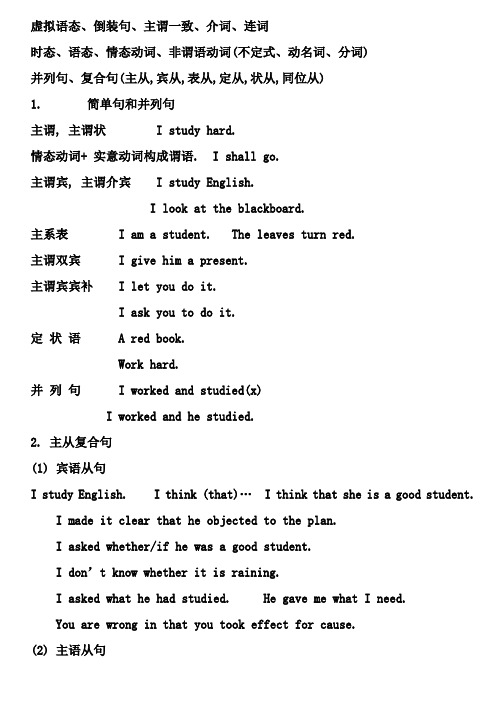
虚拟语态、倒装句、主谓一致、介词、连词时态、语态、情态动词、非谓语动词(不定式、动名词、分词)并列句、复合句(主从,宾从,表从,定从,状从,同位从)1. 简单句和并列句主谓, 主谓状 I study hard.情态动词+ 实意动词构成谓语. I shall go.主谓宾, 主谓介宾 I study English.I look at the blackboard.主系表 I am a student. The leaves turn red.主谓双宾 I give him a present.主谓宾宾补 I let you do it.I ask you to do it.定状语 A red book.Work hard.并列句 I worked and studied(x)I worked and he studied.2. 主从复合句(1) 宾语从句I study English. I think (that)… I think that she is a good student.I made it clear that he objected to the plan.I asked whether/if he was a good student.I don’t know whether it is raining.I asked what he had studied. He gave me what I need.You are wrong in that you took effect for cause.(2) 主语从句That the sun moves around the earth is the truth.( it is the truth that..)Whether it is raining is not known.It is not known--computers will one day have vision as good as human vision.A.whetherB. ifC. thatD. howIt goes without saying that we are not living in a traditional society. Who will come to the meeting remains unknown.翻译题: In a sense, what he said amounts to threat.(3) 表语从句Your greatest fault is that you are careless.The problem is what we should do to help him.(4) 形容词补语从句We feel proud that our team has won every match this year.He wasn’t sure whether he should stay or leave.Are you certain who he is?(5) 同位语从句(fact, news, idea, opinion, concern, hope, theory, decision, discovery, conclusion, report,order, question, problem, belief, truth, answer, statement, promise, possibility.)The news that he intended to come gave us much pleasure.(6) 状语从句时间状语从句When I studied, the bell rang.She was going upstairs when suddenly the light went out.He had no sooner died than/ he had hardly died when the family arguments began.地点状语从句He live where he liked.原因状语从句He was late because he missed the bus.Now that you mention it, I do remember.I’m in a slightly awkward posit ion, in that my secretary is on holiday at that moment.目的状语从句We have so arranged matters that one of us is always on duty.Bring it closer so that I may see it better.结果状语从句He brought a big house so( that) he had more space to paint in.He made such a good speech that he won warm applause.翻译题:The brothers looks so alike that it is difficult to tell them each other条件状语从句If I make a promise, I keep it.I’ll lend you the money , as/so long as you take my advice.These messages will become rubbish unless some measures have been taken. 让步状语从句Although/ though he was Spanish, he spent most of his life in Germany. Whatever/ No matter what happens, you must be calm and quiet.However/no matter how loudly you shout, you won’t be heard.方式状语从句I have changed the plan as you suggested.As if ( as though)比较状语从句(重点)She is as tall as Tom( is) I arrived as early as you (did)Mary was older/more careful than Tom( was)Mary works harder /more carefully than Tom( does)Bill speaks French ----( badly) than he writes it.The –( far)away we get from the earth, the thinner the air becomes. further进(8) 定语从句在从句中成份+连词She is a beautiful girl. I like the girl who is beautiful.( who主语) This is the film that I see.This is the boy who (whom)(--) you met yesterday. (主语)Tell me something about the man for whom I shall be working / (whom) I shall be working for.I read the book whose cover is red.You are still the same person as I knew ten years ago.I never heard such stories as he told.This is the day when( on which) I joined the league.This is the house where( in which) I live./ This is the house I live in. 非限定性定语从句:He met Mary, who invited him to dinner.I gave the book to Tom, whom/ who I found after the meeting.Her doctor, whose office was newly decorated, started to charge higherfee.His latest play, which was well reviewed by the critics, has been a great success.I called him by the wrong name, for which mistake I apologized.Prof. Emery, about whom everyone is taking these days.There are only four areas ____ very many diamonds have been found.A.whereB.whenC.thatD.whichWhere用在定语从句和状语从句的区别I’ll go to the place (where I live)I’ll go wherever work conditions are difficult.定语从句和同位语从句的区别The news (that our team had won)was known to all.This is the film that (I see).考题: Such people – you describe are rare nowadays.a. asb. thatc. whod.whichAnyone ---( want) to understand the industry of the future will have to know about IT . [who want]Who wants Many of us visited the industrial exhibition,---,to our disappointment, we saw very few high-tech products.a. whereb. whichc. asd. that3. 并列复合句He said that he would give up smoking, but nobody believe it.I never saw a busier person than she seemed to be; yet it was difficult to say what he she did.重点语法——动词的时态和语态时态的呼应I thought the experiment was going on now.She said this apparatus would be available next week.Am/is/are/+ done. This room is cleaned every day.Was/were +done This room was cleaned yesterday.Will be+ done This room will be cleaned.Am/is/are being done This room is being cleaned at the moment. Was/were being done This room was being cleaned when I arrived. Have/has been done My car has been repaired.Had been done The room looks much better. It had been cleaned. No sooner had I arrived at the theatre than the film began. Hardly….. whenSome people think that the relations between people have deteriorated-( deteriorate) so much that understanding and friendship are almost impossible.Nearly a week passed before the girl was able to explain what had happened (happen) to her.非谓语动词(1) 动词不定式做主语 To see is to believe.What to do next has not been decideIt is not easy to remember all these words.表语 To know everything is to know nothing.定语 This is a book to be written.宾语 I want to study.He found it impossible to keep silent any longer.宾补 They warned me not to be late.I let you do it(make, have, see, watch, notice, look at, observe, smell, listen to, hear,perceive)状语 Yesterday he came to see me.独立成份 To be frank, she is not my girlfriend.形容词补语 I am glad to hear the news.不定式的逻辑主语 For a bridge to collapse like that is unbelievable. 不定式的时态和语态 to do(be) , to be+p.p.to have done, to have been done动名词主,表语 Seeing is believingTom’s going there won’t do any harm.My hobby is collecting stamps.定语 This is a swimming poor. ( a poor for swimming)This is a hiding place ( a place for hiding )宾语 I enjoy studying (mind, keep, appreciate, can’t help, consider, postpone,suggest,admit etc.)Do you mind my smoking here?介词+ 宾语I used to doing. (confess to, look forward to, object to doing sth.) be involve in, consist of, be fond of, etc.动名词的时态和语态基本形同分词的时态和语态分词状语 When I saw the film, I felt sad = Seeing the film, I felt sad. Because it is Sunday today, we have no school.It being Sunday, we have no school.When the job was finished, we went home straight away.The job finished, we went home straight away.定语 The boy standing there is a classmate of mine.=The boy who is standing there is a classmate of mine.The used car. A broken cup the question involved.表语 The film is exciting. All the windows are broken.宾补 I found them watering flowers.( I found that they were watering flowers.I found the flowers watered. ( I found the flowers watered)分词的时态和语态.( 形同动名词)doing (being) being donehaving done having been done______nothing to say, the boy shield way form the crowd.A. HavingB. Have C Had. D. Having beingWhat developed was a music readily taking ( take) on various forms.Not having got (not get) enough hands, she had great difficulty in accomplishing the task.非谓语动词答题要点1. Anyone wanting (want) to understand the industry of the future will have to know about robotics.2.A Filipino maid was executed in Singapore after being convicted (convict)of murder.3. As research techniques become more advanced, the number of animals used( use) in experiments may decrease.Not have got (not, get)enough hands she had great difficulty in accomplishing the task.It is a well-known fact that a person will move in a circle when he cannot use his eyes to control ( control) his direction.As I’ll be away for a year,I’d appreciate hearing (hear)from you now and then.Object to , confess to , look forward to + doing.介词+ doing.If I had remembered --- the window, the thief would not have got in.a. to closeb. closingc. to have closed. having closed. Begin, start, intend, continue to do, doing 的区别不大The baby began crying. The baby began to cry.Try to do. 努力去做 Try doing 尝试去做.I was very tired. I tired to keep my eyes open, but I couldn’t.I can’t find anywhere to live.______, they began to get down to business. A. The holidays being over B. The holidays are over C. The holidays were over D. The holidays had been overV+ing及从句的固定用法It’s no use doing sth.It’s no use worrying about it. There’s nothing you can do.It’s (not) worth doing sth.Have difficulty doing sth.Spend time (in) doing sth.There is no doubt that.强调句1. 强调主语 It is I that/who am to blame2. 强调直接宾语 It was a glass that Mary broke.3. 强调间接宾语 It was him that I gave the pen to.4. 强调介词宾语 It is this room that I am living in.5. 强调状语1) 时间状语 It was last year that Tom graduated from high school.2) 地点状语 It was under the bridge that we found him.3) 原因状语 It was for his arrogance that I dislike him.4) 目的状语 It was for pleasure that I read it.不仅可以是陈述句, 还可以是疑问句和感叹句.Was it you that/who lost a watch yesterday? What great progress it was that you made.强调句可以是一个从句, 被强调的部分也可以是从句.I was told that it was because he hadn’t received the invitation that he didn’t comeIt was there, the police believe,she was able to activate the recorder she kept in her bag.A. thatB.untilC. whichD. when虚拟语气第一类型: 见词就填:A. (should ) do(should) beB. (should) be +过去分词第一类型虚拟语气 A第一类型虚拟语气 B见某些形容词要虚拟Urgent, necessary, important, possible, essential, incredible, natural, ridiculous, vital, imperative, crucial, critical, proper, compulsory, etc.形容词带的从句: It is important that every member (should) inform himself of these rules.主语从句: It is decided that the meeting (should) be postponed.宾语从句: He insisted that his daughter (should) come.表语从句: The doctor’s advice is that the patient (should) be kept quiet. 同位语从句: He gave order that the guests (should) be hospitably entertained.考题: They demanded that the right to vote----(give) to every adult person. [(should) be given]For a child to give up less mature idea for a more sophisticate one, it requires that the child ____ psychologically ready for the new idea.A.isB.beC.wereD.would be第二类型: if 的非真实条件句( 可能性小或没有可能)注意: if 可以引导真实条件句,多是条件状语从句.第二类型虚拟语气 (时态到推的概念)第二类型虚拟语气举例省略if 的倒装were, had , should.If the doctor had been available, the child would have been saved.Had the doctor been available, the child would have been saved.考题:_____for your help, I would not have overcome the psychological pressures and tensions.A. Had it not beenB. not beenC. Without beingD. not having been 特殊虚拟?Even if 形式上与if 相同Wish形式上大体与if 从句相同从句谓语与Wish同时 Wish+主语+V.ed/wereI wish I were as young as you.从句谓语发生Wish之前多用Wish+主语+had done(been)I wish that he had not made so much trouble.从句谓语发生Wish之后用Wish+主语+would(could) + v.I wish you would stay with me far a whileI wish I could fly.It is (about. High..) time that + 从句 (V.ed)It is high time that we began to work.In case, lest, for fear that (should)+ V.The mad man was out in the padded cell lest he ---himself.A. injureB. had injured c. injured d. would injure.Would rather =had rather, would just as soon, would sooner, would prefer 多加过去式表示尚未发生的动作.倒装句全部倒装 In came Jack. Now comes your turn.Among them were two girls.部分倒装Hardly/scarcely/barely had we got on the bus when it began to rain.No sooner had he put down the receiver than the telephone rang again.Not until many years later did the whole truth become known.Not only did he win the championship in the race, but he also broke the world record.Neither my sister nor I have traveled by air.Never, nowhere, no longer, little, feww, not…( not a single word) no. (at no time, by no means, in no way, on no account, under/in no circumstances) Only here can you buy fresh eggs.主谓一致要点To become actresses is their ambition.Nodding often means you say” yes.”What I did was to give her a book. Neither she nor I am wet.Many a student doesn’t like having to do their homework.连词连接代词 who, whom, whose, what, which, whoever, whatever, which ever 连接副词 when, how, why, where, whenever, wherever并列连词 and, but, or, so , therefore, yet, however, nevertheless, for, hence, as well as, both..and, not only..but also, either..or, neither..nor, 从属连词 after, when, before, as, while, since, until, till, although, though, if , even if, unless, lest, because, than, that, whether, so that, as soon as, as long as, in order that, as if, as though, in case, now that, so..that, such..that, as .as.When we play a game, we enjoy what we are doing, --- we should not play it.A. otherwiseB. insteadC. neverthelessD. either不定代词Any,one,none,nothing, neither, either, both, all, anyone, any one, some, any, much, manyAre you sure there are not--- sharks here? A.any B. some C. many D. much.Used to , be used to doingFrank lives alone,. He doesn’t mind this because has lived alone for 15years. So he is used to it. He is used to living alone.These days I usually stay in bed until late. But when I had a job, I used to get up early.词汇题常考动词搭配Come, carry, take, go,get,cut, make, put ,turn, bring.完型填空题型分析考察重点主谓一致,动词时态和语态,名词的数,代词,形容词副词的比较级,介词和连词.常用词语搭配.70%考连词,代词,介词以及承上启下的其他词和词组.方法: 先跳空通读全文,然后根据语法结构, 语义连贯,词与词的搭配填空, 最后在通读全文. 注意顾全大局.选的是最佳答案.词型填空题大部分为动词.阅读理解题型分析考察(1)词和短语的意义(2)句子表达的各个内容之间的关系(3)文章的主题思想和大意(4)文章或某句的内在含义及推理(5)文章作者的态度.答题方法:先看题—阅读的难点不是考试的重点,不要死扣一句,第一段和最后一段, 段首和段尾句,多数题目可以在文章中找到相应的段落,句子或短语.翻译题评分原则为:(1) 主要语法错误(如动词时态、语态、虚拟语气、主谓一致、否定、疑问以及其他句型错误)或影响基本句意的重要用词错误扣1分。
完整版自考英语二重点班讲义01--15

完整版讲义---华夏大地自考高伟老师主讲,真的很MAN!!第一单元知识点的回顾Text A1.choose----choice:词型转换经常考,同时注意该词的过去式和过去完成式。
2.★available:这个词考的频率很高。
换句话说,如果在答案中出现了该词,从词义上应该给予其优先考虑。
这个词出现的句子中经常会同时出现ticket, food, book等。
3.decide----decision,注意词性上的变化。
4.purpose:这个词一旦出现,它既可以考本词的意思,也可以考后面的谓语动词的形式,记住:凡是出现purpose, aim, objective, plan,dream, goal等有含有目的性的词,后面的谓语动词一定是to do的形式,同时关注这些词是否为复数形式,如果是,谓语动词一定是复数的。
5.achieve----achievement,注意词型上转换。
6.★in the way:妨碍,挡路,阻碍。
区别in a way:从某种程度上。
★on theway (to)在去…路上(★on the way home)和by the way:顺便说一句。
7.★★involve----involve ment(in):注意词型转换,词义及介词搭配。
8.★consider----consideration。
注意词型上的转换,同时牢记take intoconsideration(account),如果单独考本词,后面的动词一定是+ing形式(动名词),但注意主动和被动含义上的区别。
9.make a guess at:注意固定习语的搭配。
10.certain----certainly----★certainty----★★uncertainty:注意词性和词义上的转换。
11.risk:注意后面接ing的动名词形式。
12. sometimes…;at other times…:注意前后句型上的搭配,很有可能在完型里考。
自考英语二教材课文讲义unit
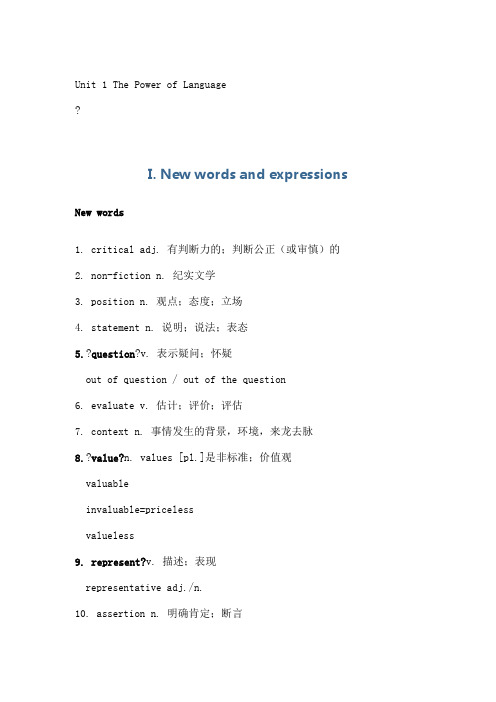
Unit 1 The Power of Language?I. New words and expressions New words1. critical adj. 有判断力的;判断公正(或审慎)的2. non-fiction n. 纪实文学3. position n. 观点;态度;立场4. statement n. 说明;说法;表态5.?question?v. 表示疑问;怀疑out of question / out of the question6. evaluate v. 估计;评价;评估7. context n. 事情发生的背景,环境,来龙去脉8.?value?n. values [pl.]是非标准;价值观valuableinvaluable=pricelessvalueless9. represent?v. 描述;表现representative adj./n.10. assertion n. 明确肯定;断言11. sufficient?adj.?足够的;充足的sufficiencyinsufficient12. statistic n. statistics [pl.]统计数字;统计资料13. integrate v.(使)合并,成为一体14. authority?n.专家;学术权威;泰斗an/the authority on sth.authorize15. compare?v. 比较;对比compare A with Bcompare A to B16. subject n. 主题;题目;题材17. consistent adj. 相符的;符合的18. inconsistency n. 不一致19. assumption n. 假定;假设20. case?n. 具体情况;事例in casein case of firein case that…a case in pointconfirmed/suspected cases21. directly adv. 直接地;径直地22. identify v. 找到;发现23. valid?adj. 符合逻辑的;合理的;确凿的validity n. 有效性,正确(性)invalid24. credible?adj. 可信的;可靠的incredible=unbelievable25. landmark n.(标志重要阶段的)里程碑26. relevant?adj. 紧密相关的;切题的relevancy n. 关联;恰当irrelevant27. current adj. 现时发生的;当前的28. appropriate?adj. 合适的;恰当的inappropriateIt's (not) appropriate that ….29. bias n. 偏见;偏心;偏向30. considerably?adv. 非常;很;相当多地considerconsideringconsiderableconsiderateconsideration31. Democrat n. (美国)民主党党员,民主党支持者民32. Republican n. (美国)共和党党员,共和党支持者33. reflect v. 显示;表明;表达34. informed?adj. 有学问的;有见识的well-informedill-informedPhrases and Expressions1. apply to 使用;应用2. put forth 提出;产生3. take … into account 考虑到;顾及4. accept/take … at face value 相信表面;信以为真5. with a grain of salt 有保留地;持怀疑态度地II. Text LearningCritical Reading①?(1)Critical reading?applies to?non-fiction writing?in which?the author?puts forth a position?or seeks to make a statement.?Critical reading is active reading. It involves more than just(不只是,不仅仅是) understanding what an author is saying. Critical reading involves questioning and evaluating what the author is saying, and forming your own opinions about what the authoris saying.?Here are the things you should do to be a critical reader.(启下句)本部分重点及难点:1. Critical reading?applies to?non-fiction writing?in which?the author?puts forth a position?or seeks to make a statement.apply to sb./sth.= be applicable to sb./sth.apply的派生词:application, applicant, applicable②?Consider the context of what is written. You may be reading something that was written by an author from a different cultural context?than?yours.?(2)Or, you may be reading something written?some time?ago in a different time context than yours.?(3)In either case, you must recognize and take into account any differences between your values and attitudes and those represented by the author.?本部分重点及难点:2. Or, you may be reading something written?some time?ago in a different time context than yours.some time注意区分:sometime / sometimes / some times3.?In either case, you must recognize and?take into account?any differences between your?values andattitudes?and?those?represented by the author. 不论哪种情况,你必须注意并考虑你的价值观和态度与作者所述的价值观和态度有何不同。
(完整版)新版自考英语(二)课文精讲.doc

新版自考英语(二)课文精讲第一单元 A 课II.Text LearningCritical Reading① (1)Critical reading applies to non-fiction writing in which the author putsforth a position or seeks to make a statement. Critical reading is activereading. It involves more than just(不只是,不仅仅是) understanding what an author issaying. Critical reading involves questioning and evaluating what the author is saying, and forming your own opinions about what the author is saying. Hereare the things you should do to be a critical reader(.启下句)本部分重点及难点:隐藏重难点解析1. Critical reading applies to non-fiction writing in which the authorputs forth a position or seeks to make a statement.apply to sb./sth.= be applicable to sb./sth.apply 的派生词: application, applicant, applicable②Consider the context of what is written. You may be reading something that was written by an author from a different cultural context than yours. (2)Or, you may be reading something written some time ago in a different time contextthan yours. (3)In either case, you must recognize and take into account any differences between your values and attitudes and those represented by the author.本部分重点及难点:隐藏重难点解析2.Or, you may be reading something written some time ago in a differenttime context than yours.some time注意区分: sometime / sometimes / some times3.In either case, you must recognize and take into account any differences between your values and attitudes and those represented by the author.不论哪种情况,你必须注意并考虑你的价值观和态度与作者所述的价值观和态度有何不同。
自考汉语言本科:00015英语二讲义第1章(Unit 1 The Power of Language ) 0105
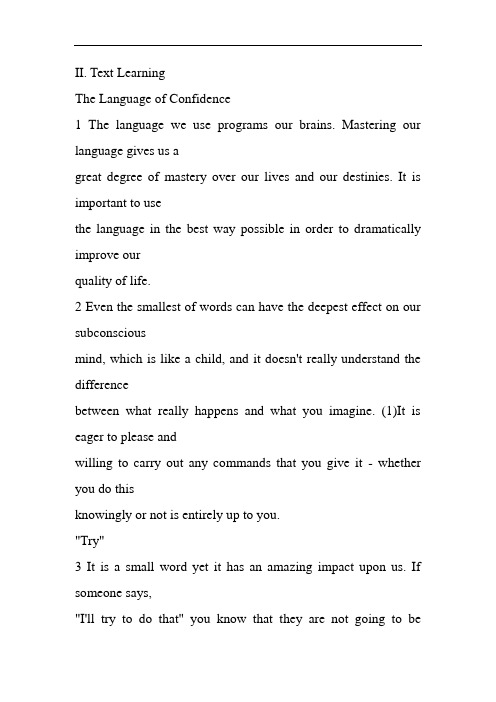
II. Text LearningThe Language of Confidence1 The language we use programs our brains. Mastering our language gives us agreat degree of mastery over our lives and our destinies. It is important to usethe language in the best way possible in order to dramatically improve ourquality of life.2 Even the smallest of words can have the deepest effect on our subconsciousmind, which is like a child, and it doesn't really understand the differencebetween what really happens and what you imagine. (1)It is eager to please andwilling to carry out any commands that you give it - whether you do thisknowingly or not is entirely up to you."Try"3 It is a small word yet it has an amazing impact upon us. If someone says,"I'll try to do that" you know that they are not going to beputting their wholeheart into it, and may not even do it at all. (2)How often do you use the wordtry when talking about the things that matter to you? Do you say "I'll try to bemore confident" or "I'll try to do that" or "I'll try to call"?4 Think about something that you would like to achieve, and say it to yourselfin two different ways. Firstly say, "I'll try to …" and notice how you feel.Next say, "I will do …" and see how you feel.5 (3)The latter makes you feel better than the first one, doesn't it? It givesyou a sense of determination, a feeling that it will be done. Listen to thepeople around you and when they say they will try notice if it gets done or not.Eliminate the word try from your dictionary and see how your life improves.(承上句)本部分重点及难点:显示重难点解析1. It is eager to please and willing to carry out any commandsthat you give it- whether you do this knowingly or not is entirely up to you.它渴望取悦,乐意听从你给它的任何命令,而你是有意还是无意地做这些完全取决于你。
(完整版)最新版自考英语二精讲讲义
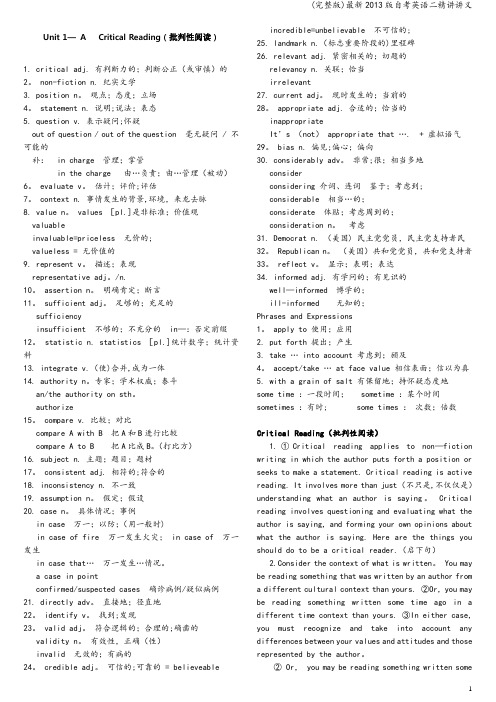
(完整版)最新2013版自考英语二精讲讲义Unit 1—A Critical Reading(批判性阅读)1. critical adj. 有判断力的;判断公正(或审慎)的2。
non-fiction n. 纪实文学3. position n。
观点;态度;立场4。
statement n. 说明;说法;表态5. question v. 表示疑问;怀疑out of question / out of the question 毫无疑问 / 不可能的补: in charge 管理;掌管in the charge 由…负责;由…管理(被动)6。
evaluate v。
估计;评价;评估7。
context n. 事情发生的背景,环境,来龙去脉8. value n。
values [pl.]是非标准;价值观valuableinvaluable=priceless 无价的;valueless = 无价值的9. represent v。
描述;表现representative adj。
/n.10。
assertion n。
明确肯定;断言11。
sufficient adj。
足够的;充足的sufficiencyinsufficient 不够的;不充分的 in—:否定前缀12。
statistic n. statistics [pl.]统计数字;统计资料13. integrate v.(使)合并,成为一体14. authority n。
专家;学术权威;泰斗an/the authority on sth。
authorize15。
compare v. 比较;对比compare A with B 把A和B进行比较compare A to B 把A比成B。
(打比方)16. subject n. 主题;题目;题材17。
consistent adj. 相符的;符合的18. inconsistency n. 不一致19. assumption n。
(完整word版)自考英语(二)串讲讲义
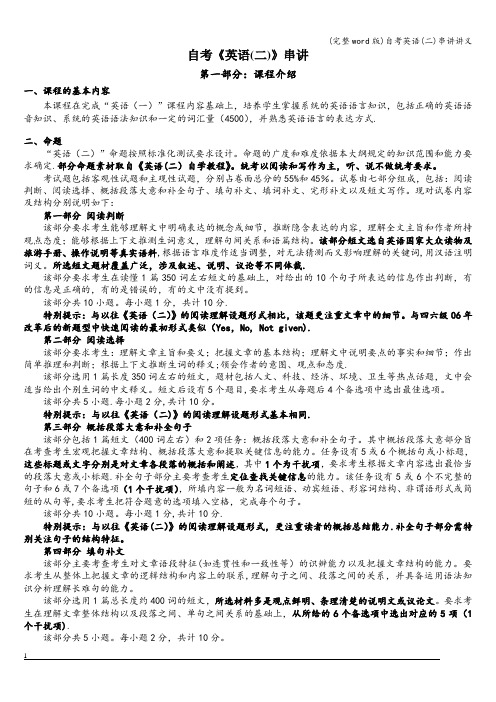
自考《英语(二)》串讲第一部分:课程介绍一、课程的基本内容本课程在完成“英语(一)”课程内容基础上,培养学生掌握系统的英语语言知识,包括正确的英语语音知识、系统的英语语法知识和一定的词汇量(4500),并熟悉英语语言的表达方式.二、命题“英语(二)”命题按照标准化测试要求设计。
命题的广度和难度依据本大纲规定的知识范围和能力要求确定.部分命题素材取自《英语(二)自学教程》。
统考以阅读和写作为主,听、说不做统考要求。
考试题包括客观性试题和主观性试题,分别占卷面总分的55%和45%。
试卷由七部分组成,包括:阅读判断、阅读选择、概括段落大意和补全句子、填句补文、填词补文、完形补文以及短文写作。
现对试卷内容及结构分别说明如下:第一部分阅读判断该部分要求考生能够理解文中明确表达的概念或细节,推断隐含表达的内容,理解全文主旨和作者所持观点态度;能够根据上下文推测生词意义,理解句间关系和语篇结构。
该部分短文选自英语国家大众读物及旅游手册、操作说明等真实语料,根据语言难度作适当调整,对无法猜测而又影响理解的关键词,用汉语注明词义。
所选短文题材覆盖广泛,涉及叙述、说明、议论等不同体裁.该部分要求考生在读懂1篇350词左右短文的基础上,对给出的10个句子所表达的信息作出判断,有的信息是正确的,有的是错误的,有的文中没有提到。
该部分共10小题。
每小题1分,共计10分.特别提示:与以往《英语(二)》的阅读理解设题形式相比,该题更注重文章中的细节。
与四六级06年改革后的新题型中快速阅读的最初形式类似(Yes,No, Not given).第二部分阅读选择该部分要求考生:理解文章主旨和要义;把握文章的基本结构;理解文中说明要点的事实和细节;作出简单推理和判断;根据上下文推断生词的释义;领会作者的意图、观点和态度.该部分选用1篇长度350词左右的短文,题材包括人文、科技、经济、环境、卫生等热点话题,文中会适当给出个别生词的中文释义。
2013新版自考英语(二)讲义超级完整版

2013新版自考英语(二)讲义超级完整版2013年新版英语二讲义(全)Unit 1 The Power of Language I. New w o rd s an d ex p ress io n sNe w wor ds1. c r itic a l a dj. 有判断力的;判断公正(或审慎)的2. no n-f ic tion n. 纪实文学3. pos iti on n. 观点;态度;立场4. s tatem ent n. 说明;说法;表态5. qu es tio n v. 表示疑问;怀疑out of ques ti on / ou t of the q ues ti on6. e va luat e v. 估计;评价;评估7. c ont ex t n. 事情发生的背景,环境,来龙去脉8. v al ue n. v al ues [p l.]是非标准;价值观va lu abl ein va lua bl e=pr ic el es sva lu eles s9. r epr es e nt v. 描述;表现r epr es enta tiv e a dj./n.10. as s er ti on n. 明确肯定;断言11. s uf f ic ient a dj. 足够的;充足的Suf f ic ienc y ins uf f ic ient12. s tat is tic n. s tat is ti c s [pl.]统计数字;统计资料13. inte gr ate v.(使)合并,成为一体14. a uth or it y n.专家;学术权威;泰斗an/th e a uthor it y o n s th.auth or i ze15. c om par e v. 比较;对比c om par e A w ith Bc om par e A t o B16. s ubj ec t n. 主题;题目;题材17. c ons is tent adj. 相符的;符合的18. inc ons is t enc y n. 不一致19. as s um ption n. 假定;假设20. c as e n. 具体情况;事例in c as ein c as e of f ir ein c as e t hat…a c as e i n po intc onf irm ed/s us pec ted c as es21. d ir ec tl y a d v. 直接地;径直地22. ide ntif y v. 找到;发现23. va lid adj. 符合逻辑的;合理的;确凿的va lid it y n. 有效性,正确(性)in val i d24. c r ed ib le a dj. 可信的;可靠的inc r ed ibl e=unb el ie vab le25. lan dm ark n.(标志重要阶段的)里程碑26. r e le van t adj. 紧密相关的;切题的r ele vanc y n. 关联;恰当ir r ele va nt27. c ur r ent adj. 现时发生的;当前的28. a ppr o pr iat e adj. 合适的;恰当的ina ppr opr iat eIt's (not) ap pr opr i ate t hat ….29. b ia s n. 偏见;偏心;偏向30. c ons ider a bl y a dv.非常;很;相当多地c ons iderc ons ider ingc ons ider a bl ec ons ider a tec ons ider a tio n31. D em oc r at n. (美国)民主党党员,民主党支持者民32. R epu bl ic an n. (美国)共和党党员,共和党支持者33. r ef lec t v. 显示;表明;表达34. inf or m ed adj. 有学问的;有见识的wel l-inf or m edil l-inf or m edPhr as es a nd Ex pr es s i ons1. ap pl y t o 使用;应用2. pu t f or th 提出;产生3. tak e … i nto ac c oun t 考虑到;顾及4. ac c ept/tak e … at f ac e v alu e 相信表面;信以为真5. wi th a gr ai n of s alt有保留地;持怀疑态度地II. T ext L earn in gCr itic a l R e ad ing① (1)Cr itic a l r ead ing app lies to n on-f ic tio n wr i tin g in whic h th e a uthor pu tsf or th a pos it io n or s e ek s to m ak e a s tatem ent. C r itic a l r ea di ng i s ac tiv er eadi ng. It in vo lv es m or e than j us t(不只是,不仅仅是)und er s tand ing what an a uthor is s a yi n g. Cr itic a l r ea din g in vol v es ques t ion ing an d e v alu ati ng what t he auth or is s a yi n g, and f or m ing yo u r own o pi nio ns ab out w hat t he auth or is s a yi ng. H er e ar e the t hi ngs yo u s hou ld do t o be a c r itic al r ea der.(启下句)本部分重点及难点:1. Cr it ic al r ead ing ap pli es to non-f ic tio n wr iti ng in whic h t he aut hor putsf or th a pos it io n or s e ek s to m ak e a s tatem ent.app l y to s b./s th.= b e ap pl ic abl e to s b./s t h.app l y的派生词:a p plic a tio n, a pp lic a nt, a ppl ic ab le② C ons ider t he c o nte x t of wh at is wr itte n. You m a y be r ea di ng s om ething that w as wr itt en b y a n aut horf r oma diff er ent c u ltur a l c ont ex t th an your s.(2)O r, you m a y b e r e adi ng s om ethin g wr it t en s om e tim e ago in a dif f er ent tim e c ontex t tha n yo ur s. (3)In eit her c as e, you m us t r ec ogn i ze an d tak e into ac c ount a n y dif f er enc es bet ween yo ur v al u es and att itud es an d t hos er epr es ente d b y t he a u thor.本部分重点及难点:2. O r, yo u m a y be r ea din g s om ething wr itt e n s om e tim e ago in a dif f er ent tim e c ontex t tha n yo u r s.s om e tim e注意区分:s om etim e / s om etim es / s om e tim es3. I n eit her c as e, you m us t r ec ogn i ze and ta k e into acc ount a n yd i ff er enc es bet we en yo ur v al ues and att itud es an d t hos e r epr es e nted b y t he auth or. 不论哪种情况,你必须注意并考虑你的价值观和态度与作者所述的价值观和态度有何不同。
- 1、下载文档前请自行甄别文档内容的完整性,平台不提供额外的编辑、内容补充、找答案等附加服务。
- 2、"仅部分预览"的文档,不可在线预览部分如存在完整性等问题,可反馈申请退款(可完整预览的文档不适用该条件!)。
- 3、如文档侵犯您的权益,请联系客服反馈,我们会尽快为您处理(人工客服工作时间:9:00-18:30)。
完整版讲义---华夏大地自考高伟老师主讲,真的很MAN!!第一单元知识点的回顾Text A1.choose----choice:词型转换经常考,同时注意该词的过去式和过去完成式。
2.★available:这个词考的频率很高。
换句话说,如果在答案中出现了该词,从词义上应该给予其优先考虑。
这个词出现的句子中经常会同时出现ticket, food, book等。
3.decide----decision,注意词性上的变化。
4.purpose:这个词一旦出现,它既可以考本词的意思,也可以考后面的谓语动词的形式,记住:凡是出现purpose, aim, objective, plan,dream, goal等有含有目的性的词,后面的谓语动词一定是to do的形式,同时关注这些词是否为复数形式,如果是,谓语动词一定是复数的。
5.achieve----achievement,注意词型上转换。
6.★in the way:妨碍,挡路,阻碍。
区别in a way:从某种程度上。
★on theway (to)在去…路上(★on the way home)和by the way:顺便说一句。
7.★★involve----involve ment(in):注意词型转换,词义及介词搭配。
8.★consider----consideration。
注意词型上的转换,同时牢记take intoconsideration(account),如果单独考本词,后面的动词一定是+ing形式(动名词),但注意主动和被动含义上的区别。
9.make a guess at:注意固定习语的搭配。
10.certain----certainly----★certainty----★★uncertainty:注意词性和词义上的转换。
11.risk:注意后面接ing的动名词形式。
12. sometimes…;at other times…:注意前后句型上的搭配,很有可能在完型里考。
13.range:这个词应该注意经常考的方式,range from…to…,句子中经常会出现price,或地点等波及到范围上的词汇。
14.a number of/the number of:注意区别后面的谓语动词的单、复数。
15.★(be)based on/upon:注意搭配,完型常考。
16.therefore:学会so的另一种表达方式,说明结果,完型常考(=consequently,本词还需要注意词型转换consequent/consequence)。
17.treat:注意搭配及同义词组,treat…as, see…as,view…as;另外treat theproblem=deal with=cope with。
18.★simplify:注意词根simple,动词化后变成了该词,该词经常考,比如“把演讲的内容、把陈述/问题等简单化”等等,前面一般会出现complex/complicate(复杂的)/difficult/hard to understand。
19.tend to:无论是本词,还是其名词形式tendency,都注意与to形成搭配。
20.★as well as:注意前后词态上的一致性,完型和一致性经常考。
21.★★contribute to:无论是动词形式,还是名词形式contribution,都代表了“对…贡献”、“促进”,同时注意to为介词,后面一定要用动名词形式。
22.★depend on/upon:一定注意词组的搭配,同时如果后面出现动词用动名词形式。
23.★less than----more than:注意两词组含义上差别,同时在句子中很可能出现考查形容词比较级的问题,完型常考。
24.effec t(have effect on)----effective----effectively:注意词性方面的转化。
25.be beneficial to: 注意词组含义,同时注意与benefit(from)之间的转化。
26.in part(部分地)----on the part of(就…而言)----★partially:与part有关的考点就这些。
27.When presented with…:注意句型,“当面临着…”,翻译题中常考。
28.person(in person)----personal----personally----personality:注意词性的转化。
29.accept----acceptable----unacceptable:注意词性转换及含义上的反差。
30.★cause=bring about=result in,导致,引起31.isolate----isolation,注意搭配,★isolate from隔离,分开。
句中可能会出现patient(患者)、人与人之间的隔离或地域方面由于灾难性造成隔离等方面的词汇。
32.point of view:注意词组的完整表达方式。
33.intended-----unintended :注意词性转换及动词搭配(to)。
Text B1.★apply for/apply to----application:前者表示申请,经常句中会出现job/position,后者表达“应用”。
2.★indifference to(indifferent to):对…漠不关心,注意搭配及含义(阅读的问题中经常出现该词,考察大家对作者写作的态度)。
3.speech----speechless,注意含义上的反差,会在word form中考。
4.clarify----clarification:注意词性转化。
5.★efficient(ly)----inefficient(ly)----efficiency----inefficiency:注意词性转换及词义上的改变,词型转换常考。
6.find oneself doing(done):注意后面动词的形式,主动=ing,被动=ed。
7.in hand:注意词组含义,区别at hand。
8.in case:注意词组含义及在虚拟语气中的用法(从句中使用动词原形)。
9.★★★like----likely(unlikely)----likelihood:一定要区别开,后两者表示“可能的/可能性”,形成固定搭配be likely to do。
unlike----dislike:前者表示“不像”,后者表示“厌恶”。
10.pain----painful:注意词性转换。
11.★turn down:注意turn与其他介词的搭配。
12.on the spot:注意词组含义。
13.as for----as to:都表示“关于,至于”,但as for常用来引出主题的改变,用在句首,含贬义。
第二单元重点内容的回顾Text A1.adequate----inadequate:注意词意上的反差。
2.★escape from:首先注意词组的搭配,其次escape后面需使用动名词,但需要注意主动和被动含义。
3.★or so:注意词组含义,经常会在完型填空内考,尤其or。
4.explode----explosion:注意词性的变换。
5.dense----density: 注意词性的变换,常与fog, air, population等词连用。
6.so…that…:注意句型上的前后搭配,经常在完型中出现。
7.★have idea of+n./Ving:“有…想法或主意”,注意前后搭配,完型中常考。
8.in theory:注意词组搭配。
9.behave----behavior:注意词性转换。
10.fall into:注意介词搭配,并关注与fall有关的所有词组。
11.★It is only recently that…:注意句型,同时注意recently一出现,整个句子中需使用现在完成时。
12.research into:注意词组搭配。
13.★convince----★convincing----★★convincingly: 注意词性的变换。
14.visible----invisible----vision: 注意词意上的反差。
15.at…rate/speed:注意介词的用法。
16.make(better/best)use of:注意词组含义及搭配。
17.sound like----look like----feel like:注意固定搭配及词组含义。
Text B1.★make up/make up for:前者是“组成”,后者是“弥补”,该词组常考。
2.keep(from)…doing:注意句型要求用动名词形式。
完型和语法中经常考。
3.cloud---cloudless:注意词意上的反差。
4.more or less:注意词组含义,经常在完型和翻译中考查。
5.★as…as:注意中间用形容词和副词的原形。
6.★consist of:注意词组含义,并注意该词组不需要使用被动语态。
7.★color----colorful----colorless----colored;注意词型上的各种变化,在句子中的含义会发生变化。
8.under…circumstances:注意介词搭配,完形常考。
9.make a difference:注意词组含义。
10.It is true to say that…:注意句型,翻译常考。
11.★★the more…,the better…:注意句型及含义,“越…,越…”。
完型和词型转换经常考。
第二部分:令人头疼的语法点回顾作为英语学习者,最头疼的莫过于是英语语法的学习,今天我就动词时态的问题做部分详细的回顾。
1、现在时:经常考察真实条件/时间状语从句用现在时代替将来的用法,就是说从句中必须用现在时来表示,而主句用将来时表示。
需要注意的另一点:现在时还表示普遍真理和事实,如水开的温度、科学现象,社会现象等。
2、过去时:句子中必须出现明显的说明“过去”的时间状语,如ago, at that time, then等。
在使用时注意动词过去式的变化,尤其在被动情况下。
3、★★现在完成时:表示到现在为止已经完成的行为或已经终止的状态或一直持续到现在的行为或状态。
强调对现在已经有一定的影响或结果(already, lately, rarely, recently, for the past years, so far, since, for a long time, up till now…)。
做题目时问问自己,动作完事儿了吗?完事了,用完成,小心被动。
试试:(1)He several books on computer in the past few years.A. has translatedB. translatedC. had translatedD. was translating解析:看见什么了?选A。
